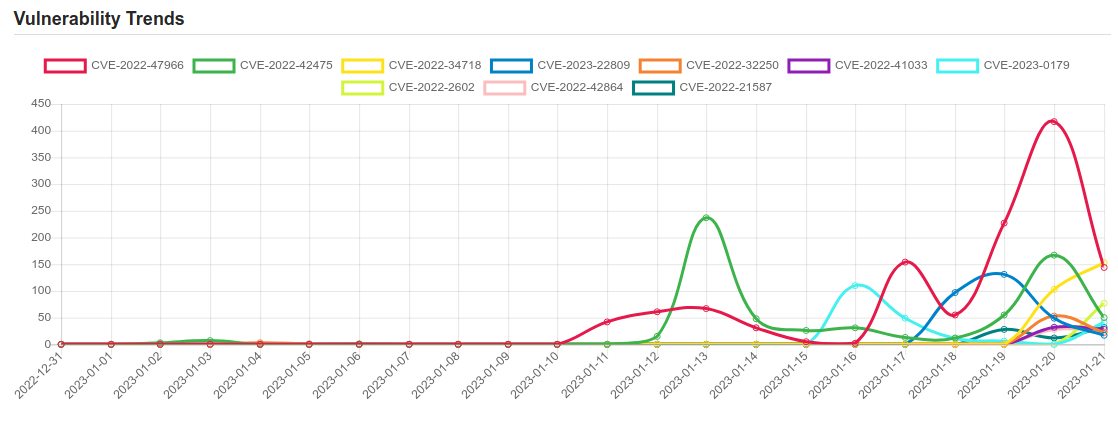Daily Vulnerability Trends: Sun Jan 22 2023

| CVE NAME | CVE Description |
| CVE-2022-35690 | Adobe ColdFusion versions Update 14 (and earlier) and Update 4 (and earlier) are affected by a Stack-based Buffer Overflow vulnerability that could result in arbitrary code execution in the context of the current user. Exploitation of this issue does not require user interaction, the vulnerability is triggered when a crafted network packet is sent to the server. |
| CVE-2022-2347 | There exists an unchecked length field in UBoot. The U-Boot DFU implementation does not bound the length field in USB DFU download setup packets, and it does not verify that the transfer direction corresponds to the specified command. Consequently, if a physical attacker crafts a USB DFU download setup packet with a `wLength` greater than 4096 bytes, they can write beyond the heap-allocated request buffer. |
| CVE-2014-0107 | The TransformerFactory in Apache Xalan-Java before 2.7.2 does not properly restrict access to certain properties when FEATURE_SECURE_PROCESSING is enabled, which allows remote attackers to bypass expected restrictions and load arbitrary classes or access external resources via a crafted (1) xalan:content-header, (2) xalan:entities, (3) xslt:content-header, or (4) xslt:entities property, or a Java property that is bound to the XSLT 1.0 system-property function. |
| CVE-2022-44877 | login/index.php in CWP (aka Control Web Panel or CentOS Web Panel) 7 before 0.9.8.1147 allows remote attackers to execute arbitrary OS commands via shell metacharacters in the login parameter. |
| CVE-2022-26486 | An unexpected message in the WebGPU IPC framework could lead to a use-after-free and exploitable sandbox escape. We have had reports of attacks in the wild abusing this flaw. This vulnerability affects Firefox < 97.0.2, Firefox ESR < 91.6.1, Firefox for Android < 97.3.0, Thunderbird < 91.6.2, and Focus < 97.3.0. |
| CVE-2022-34169 | The Apache Xalan Java XSLT library is vulnerable to an integer truncation issue when processing malicious XSLT stylesheets. This can be used to corrupt Java class files generated by the internal XSLTC compiler and execute arbitrary Java bytecode. The Apache Xalan Java project is dormant and in the process of being retired. No future releases of Apache Xalan Java to address this issue are expected. Note: Java runtimes (such as OpenJDK) include repackaged copies of Xalan. |
| CVE-2022-46169 | Cacti is an open source platform which provides a robust and extensible operational monitoring and fault management framework for users. In affected versions a command injection vulnerability allows an unauthenticated user to execute arbitrary code on a server running Cacti, if a specific data source was selected for any monitored device. The vulnerability resides in the `remote_agent.php` file. This file can be accessed without authentication. This function retrieves the IP address of the client via `get_client_addr` and resolves this IP address to the corresponding hostname via `gethostbyaddr`. After this, it is verified that an entry within the `poller` table exists, where the hostname corresponds to the resolved hostname. If such an entry was found, the function returns `true` and the client is authorized. This authorization can be bypassed due to the implementation of the `get_client_addr` function. The function is defined in the file `lib/functions.php` and checks serval `$_SERVER` variables to determine the IP address of the client. The variables beginning with `HTTP_` can be arbitrarily set by an attacker. Since there is a default entry in the `poller` table with the hostname of the server running Cacti, an attacker can bypass the authentication e.g. by providing the header `Forwarded-For: |
| CVE-2022-42475 | A heap-based buffer overflow vulnerability [CWE-122] in FortiOS SSL-VPN 7.2.0 through 7.2.2, 7.0.0 through 7.0.8, 6.4.0 through 6.4.10, 6.2.0 through 6.2.11, 6.0.15 and earlier and FortiProxy SSL-VPN 7.2.0 through 7.2.1, 7.0.7 and earlier may allow a remote unauthenticated attacker to execute arbitrary code or commands via specifically crafted requests. |
| CVE-2022-34718 | Windows TCP/IP Remote Code Execution Vulnerability. |
| CVE-2023-22809 | In Sudo before 1.9.12p2, the sudoedit (aka -e) feature mishandles extra arguments passed in the user-provided environment variables (SUDO_EDITOR, VISUAL, and EDITOR), allowing a local attacker to append arbitrary entries to the list of files to process. This can lead to privilege escalation. Affected versions are 1.8.0 through 1.9.12.p1. The problem exists because a user-specified editor may contain a “–” argument that defeats a protection mechanism, e.g., an EDITOR=’vim — /path/to/extra/file’ value. |
| CVE-2022-32250 | net/netfilter/nf_tables_api.c in the Linux kernel through 5.18.1 allows a local user (able to create user/net namespaces) to escalate privileges to root because an incorrect NFT_STATEFUL_EXPR check leads to a use-after-free. |
| CVE-2022-41033 | Windows COM+ Event System Service Elevation of Privilege Vulnerability. |
| CVE-2023-0179 | No description provided |
| CVE-2022-2602 | No description provided |
| CVE-2022-42864 | A race condition was addressed with improved state handling. This issue is fixed in tvOS 16.2, macOS Monterey 12.6.2, macOS Ventura 13.1, macOS Big Sur 11.7.2, iOS 15.7.2 and iPadOS 15.7.2, iOS 16.2 and iPadOS 16.2, watchOS 9.2. An app may be able to execute arbitrary code with kernel privileges. |
A considerable amount of time and effort goes into maintaining this website, creating backend automation and creating new features and content for you to make actionable intelligence decisions. Everyone that supports the site helps enable new functionality.
If you like the site, please support us on Patreon using the button below

To keep up to date follow us on the below channels.





![Cobalt Strike Beacon Detected - 115[.]120[.]232[.]177:4444 7 Cobalt-Strike](https://www.redpacketsecurity.com/wp-content/uploads/2021/11/Cobalt-Strike-300x201.jpg)
